You’ll be on your way up! You’ll be seeing great sights! You’ll join the high fliers who soar to high heights. —Dr. Seuss, 1990

Today is her day! Teacher Cristina Galvan flies with the high fliers. This photo and all others courtesy ARCUS / PolarTREC http://www.polartrec.org
As we write, Cristina Galvan of East Palo Alto Academy in Menlo Park, CA, is sailing on a coast guard ship, flying around in a helicopter, and getting up close and REALLY personal with polar bears. She does this as a member of ARCUS’ PolarTREC program, which is now accepting applications from teachers for the 2010 season (pending funding from the National Science Foundation).
Galvan is paired with Hank Harlow, Merav Ben-David, and John Whiteman of U of Wyoming, who are working with USGS and the USFWS to study the physiology of bears that traditionally follow the retreating sea-ice north each summer. This year other Polar TREC teachers have accompanied a science team to a crater lake in remote Russia; camped on the shores of study lakes set in some of Alaska’s prettiest back country; tagged birds on the Pribilof Islands; and sampled snow in the blue light of the Summit snow pit. And those are just a few of the north polar projects.

As part of a science in education tour in Greenland last summer, teacher Jennifer Thompson sampled snow at Summit Station.

Teacher Barney Peterson prepares a sediment trap to be dropped into a lake for climate history studies.

On Norway's Svalbard archipelago, teacher Mike Rhinard participates in a research experience for undergraduates field course studying high Arctic change. Here, the group lowers a CTD sensor into the water.
From a recent ARCUS announcement about PolarTREC: “PolarTREC . . . pairs K-12 teachers with researchers for professional development through authentic polar research experiences. The program integrates research and education to produce a legacy of long-term teacher-researcher collaborations, improved teacher content knowledge, and broad public interest and engagement in polar science.
“Through PolarTREC, teachers will spend two to six weeks in the Arctic or Antarctic, working closely with researchers in the field as an integral part of the science team. PolarTREC teachers and researchers will be matched based on similar goals and interests, and teachers will be trained to meet the program requirements prior to the field season.
“While in the field, teachers and researchers will communicate extensively with their colleagues, communities, and students of all ages across the globe, using a variety of tools including satellite phones, online journals, podcasts, and live events and web-based seminars. Teachers and research projects will be selected and matched to fill the openings available. All major expenses associated with teacher participation in PolarTREC field experiences are covered by the program, including transportation to and from the field site, food, lodging, and substitute teacher costs.”

Finnish students interact with Californian Michael Wing. Outreach with local communities is often part of the north polar TREC experience.
What ARCUS doesn’t say here is that PolarTREC is just a heck of a lot of fun. The teachers who participate interact with their students while they’re in the field, and they return to the job enriched with experience that brings their teaching to life. The scientists who host PolarTREC teachers are uniformly pleased with the experience, glad to have an extra pair of hands in the field and to have those hands attached to a mind that knows how to engage young people in the science. It’s a win-win.
Out there things can happen and frequently do to people as brainy and footsy as you. And when things start to happen, don’t worry. Don’t stew. Just go right along. You’ll start happening too. OH! THE PLACES YOU’LL GO!PolarTREC teacher application deadline: Monday, 5 October 2009
For further information, please contact PolarTREC at:
Email: info@polartrec.com
Phone: 907-474-1600
